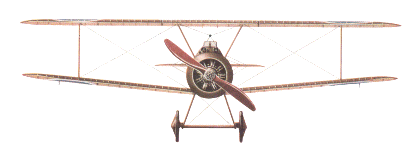


"When my brother
and I built the first man-carrying flying machine we thought that we were introducing into
the world an invention which would make future wars practically impossible." |
| World War I fliers became a new kind of cavalry, conducting from up among the clouds the same sort of missions less-favored riders still executed amid the trees and rocks. The fliers would swoop over the corpse-strewn trenches of Europe to strafe and bomb, to spy out enemy troop movements, to locate targets for the artillery and, most theatrically, to duel with the aerial cavalry of the other side. Dashing and colorful - and young (their average age was about 20) - they were feared, feted and exalted as the reincarnations of medieval knights. professional killers with the manners of gentlemen and the courage of eagles. "They recall the legendary days of chivalry," declared Prime Minister Lloyd George of Britain, "not merely by their daring exploits but by the nobility of their spirit ." Hundreds of the most stalwart fliers actually were knighted by their grateful nations. Manfred von Richthofen, for example, who abandoned his cavalry career to volunteer for the Air Service, was but one of fourscore German fliers designated a knight of the order of Pour le Merite by Kaiser Wilhelm II for repeated heroism in the air. Although the appellation of knight was widely applied to them, the great pilots more commonly became known as aces. The term at first meant an excellent flier, a high card to play against the enemy. But soon it denoted a pilot who had achieved a specific number of victories in the air. The personal nature of air combat in WWI enabled each nation to maintain a record of the successes of its aviators. Ground rules were established for confirming each victory - victory being defined as the shooting or forcing down of an enemy plane, balloon or airship regardless of whether the opposing pilot was killed or survived. Though many victories were never confirmed, literally thousands of airmen were credited with at least one victory. Generally, 5 victories were required to be considered an 'Ace'. |
U. S. WORLD WAR I FIGHTER ACES WITH 10 OR MORE VICTORIES
| Edward V. Rickenbacker 26 * | Frank Luke 18 * | William McGovern 15 | Frank L. Baylies 12 |
| S. C. Rosevear | Frank L. Hale 18 | C. T. Warman 15 | Louis B. Bennett 12 |
| William C. Lambert 22 | Paul Thayer Iaccaci 18 | Fredrick Libby 14 | Thayer A. Iaccaci 11 |
| Frederick W. Gillette 20 | Raoul G. Lufbery 17 | George A. Vaughn 13 | Jacques M. Swaab 10 |
| John J. Malone 20 | Harold A. Kullberg 16 | Field E. Kindley 12 | Reed G. Landis 10 |
| Alan M. Wilkinson 19 | Oren J. Rose 16 | Elliot White Springs 12 |
* Awarded Medal of Honor (Read a brief history of the Medal of Honor)
SEVERAL COUNTRIES RECORDED PILOTS WITH 40 OR MORE VICTORIES
| M. Von Richthofen (Ger. ) 80 |
| R. Fonck (Fr.) 75 |
| E. Mannock (GB) 73* |
| W. A. Bishop (GB) 72 * |
| E. Udet (Ger.) 62 |
| R. Collishaw (Can.) 60 |
| J. T. B. McCudden (Ire.) 57 * |
| A. W. Beauchamp-Proctor (GB) 54 * |
| D. R. McLaren (GB) 54 |
| G. Guynemer (Fr. )54 |
| W.G. Barker (GB) 53 * |
| W. Voss (Ger.) 48 |
| R. .A. Little (GB) 47) |
| P. F. Fullard (GB ) 46 |
| G.. E. H. McElroy (GB) 46 |
| C. Nungesser (Fr.) 45 |
| F. Rumey (Ger.) 45 |
| R. Berthold (Ger.) 44 |
| A. Ball (GB) 44 * |
| J. Gilmore (GB) 44 |
| T. F. Hazel (GB) 43 |
| P. Bäumer (Ger.) 43 |
| J. Jacobs (Ger.) 41 |
| B. Loerzer (Ger.) 41 |
| F. Büchner (Ger.) 41 |
| O. Boelcke (Ger.) 40 |
| L. Von Richthofen (Ger.) 40 |
| J. I. T. Jones (GB) 40 |
* Awarded the Victoria Cross (Read a brief history of the Victoria Cross.)
Source - Time Life Books
Only 19 airmen who served during World War I earned Great Britain's highest military honor, the Victoria Cross. All 19 individuals are listed here along with the date in which they won the award. Four were received posthumously. There were three Canadians, one South African, one Australian and one Irishman. They ranged in age from 19 to 32.
| William
Rhodes-Moorhouse, May 1915 (1st airman to win the Victoria Cross)* |
R. A. J. Warneford, June 1915 |
| Gilbert Insall, December 1915 | John Liddell, August 1915 |
| Lanoe Hawker, August 1915 | Richard Bell Davies, December 1915 |
| Lionel Rees, August 1916 | William Leefe Robinson, September 1916 |
| Albert Ball, June 1917 * | Thomas Mottershead, February 1917 * |
| William Bishop, August 1917 | Frank McNamara, June 1917 |
| James McCudden, March 1918 | Alan McLeod, May 1918 |
| Alan Jerrard, May 1918 | Ferdinand West, November 1918 |
| William G. Barker, November 1918 | Andrew Beauchamp Proctor, November 1918 |
| Edward Mannock, July 1919 * |
* Awarded posthumously
A complete listing of aces is available at the Fighter Pilot 'ace' list